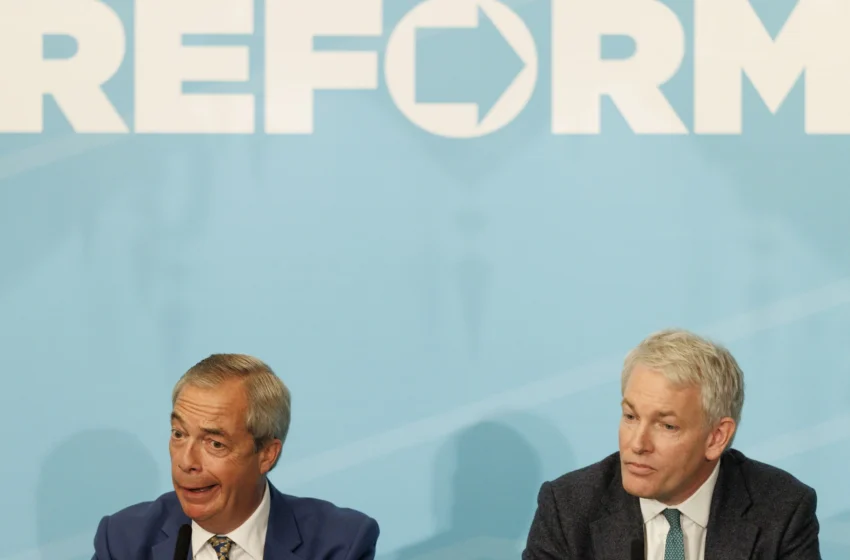Kruger’s Defection to Reform UK Unlikely to Spark Mass Tory Exodus

Kruger’s Defection to Reform UK Unlikely to Spark Mass Tory Exodus
Danny Kruger MP has formally left the Conservative Party to join Reform UK, announcing his decision alongside Nigel Farage at a press conference on September 15, 2025.
For most voters, the reaction will likely be: “Who?” While his defection has dominated headlines, it is unlikely to shift national polling or dramatically change the balance of power.
The move does, however, raise an important question for the Conservatives: does Kruger’s departure signal that the party is losing its appeal as the home for socially conservative and right-leaning MPs?
A Longstanding Social Conservative
Kruger established his reputation on the socially conservative wing of the Tories — a group historically small and often treated as outliers by party leadership. Figures like Edward Leigh and John Hayes once attempted to strengthen this faction through the Cornerstone Group in the mid-2000s, with sporadic support from David Cameron during his premiership.
Yet this bloc has steadily weakened, particularly after the 2024 general election, which saw the loss of high-profile figures like Jacob Rees-Mogg and Miriam Cates.
Limited Impact on Party Numbers
Unlike past high-profile defections, Kruger’s move is not expected to trigger a wave of MPs following him to Reform. While more resignations are possible before the end of this Parliament — and perhaps even a surprise activist defection before the October Tory conference — Kruger’s switch is more symbolic than seismic.
Other names, such as Suella Braverman, have been speculated as potential defectors, but insiders suggest his departure will not come as a shock to Kemi Badenoch or other senior Conservatives.
Conservative Identity at Stake
The broader question is whether the Tories can continue to unite different strands of the Right. Historically, the party has accommodated a diverse range of activists and MPs: the Powellites of the 1960s, the authoritarian anti-unionists of the 1970s, the economic liberals of the 1980s, and the Eurosceptics of the 1990s.
These factions often clashed with the party mainstream, but they also injected intellectual energy and grassroots enthusiasm. Without them, the Conservatives risk shrinking into a centrist, urban, middle-class party — potentially opening the door for Reform UK to emerge as Labour’s main challenger.
A Warning, Not a Collapse
Kruger’s defection does not mark the end of the Conservative Party — just as Douglas Carswell’s shift to UKIP a decade ago didn’t. But cumulatively, these moves weaken the party’s claim to represent the broad Right.
If the Conservatives fail to convince their right-wing base that the party remains the best vehicle for change, they risk long-term decline — and the real rise of Reform UK as a national force.
FAQ: Danny Kruger’s Defection to Reform UK
1. Who is Danny Kruger?
Danny Kruger is a British politician and former Conservative MP, known for his socially conservative views. He has been active in right-wing policy debates and was part of the Cornerstone Group, a faction within the Conservative Party focused on traditional values.
2. Why did Danny Kruger defect from the Conservative Party to Reform UK?
Kruger left the Conservatives due to growing disillusionment with the party’s direction under its current leadership. He believes Reform UK, led by Nigel Farage, better represents his socially conservative and right-wing views.
3. What role did Nigel Farage play in Kruger’s defection?
Nigel Farage hosted the press conference where Kruger announced his defection. Farage is positioning Reform UK as the new home for disaffected Conservative MPs and activists on the political Right.
4. Will Danny Kruger’s defection spark more Tory MPs to join Reform UK?
While Kruger’s move is significant symbolically, analysts say it is unlikely to trigger a mass exodus of Conservative MPs. Some defections may follow, but not on a scale that would collapse the party.
5. Has this type of Conservative defection happened before?
Yes. In 2014, Douglas Carswell defected from the Conservatives to UKIP, causing temporary turmoil but not destroying the party. Kruger’s defection is seen as similar—symbolic but not catastrophic.
6. How does Danny Kruger’s defection affect the Conservative Party?
It highlights the Conservative Party’s struggle to hold together its right-wing base. If more MPs or activists follow Kruger, the party could face a deeper identity crisis and lose support to Reform UK.
7. What does this mean for the future of Reform UK?
Kruger’s move gives Reform UK greater credibility, showing that sitting MPs are willing to leave the Conservatives. However, Reform still faces challenges in scaling up to become a serious electoral threat.
8. How does this affect Labour and UK politics overall?
Labour could benefit from a divided Right. If Reform UK gains momentum, it could split the Conservative vote, making it easier for Labour to win seats in future elections.
9. Which other Conservative MPs might defect to Reform UK?
Speculation has surrounded figures like Suella Braverman and other disaffected right-wing MPs. However, no major names beyond Kruger have confirmed plans to defect.
10. Could Reform UK replace the Conservative Party as the main opposition?
Not in the short term. While Reform may grow, the Conservatives remain a much larger and more established party. But repeated defections and declining grassroots support could eventually shift the balance on the political Right.

